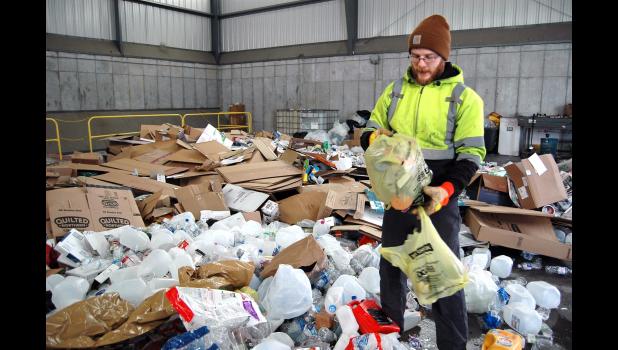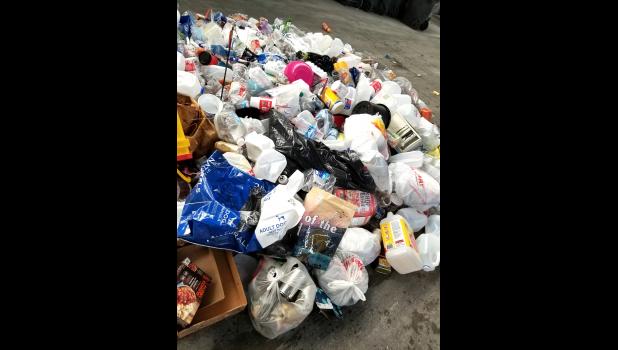One man’s trash is ... the world’s trash
By ANDREW MCGINN
Last May, Malaysia’s minister of energy, technology, science, environment and climate change told reporters that her Southeast Asian country had had just about enough of residents in Rippey.
Well, sort of.
What’s undeniably true is that Malaysia is sick and tired of being sent tons of garbage masquerading as recyclables from the developed world.
It’s sending it back.
“We are urging developed nations to review their management of plastic waste,” Yeo Bee Yin said, “and stop shipping garbage to developing countries.”
“If you ship to Malaysia,” she vowed, “we will return it back without mercy.”
So, to the person in Grand Junction who tried recycling a grease-laden Casey’s pizza box — surprise! — you’ve got a package from Kuala Lumpur.
OK, to be fair, that’s not how it works. But if there’s any hope of a rebound for the global recycling market, it’s going to take diligence at the very start of the supply chain. The whole thing hinges on what we as individuals choose to recycle.
That’s according to Troy Reynolds, manager of the recycling transfer station at the Boone County Landfill, who is clearly feeling Yeo Bee Yin’s pain.
“Copious amounts of recycling isn’t the goal versus clean recycling,” Reynolds said recently.
Since mid-December, the recycling transfer station at the Boone County Landfill has been the first stop for recyclables from six Greene County towns: Grand Junction, Rippey, Dana, Paton, Churdan and Scranton.
Even before the first truck from Greene County pulled away, Reynolds knew he had a problem.
“Most of this is just literally bags of trash,” he said, showing pictures he’s taken of items placed in local recycling bins. “This is what a Greene County box looks like.”
It’s common to find lunch meat packaging, dog food bags, plastic packaging material, fountain drink cups and plastic bags that contain nothing more than wads of other plastic bags.
“It’s dirty,” he said. “Contaminated.”
In one photo, Reynolds is holding up an unopened package of boneless, skinless chicken breasts.
“It’s not the first chicken I’ve seen,” he said.
What someone tries recycling in Churdan has global implications. In fact, contaminated recycling — and Greene County’s recyclables are especially contaminated, according to Reynolds — is what caused the recycling market to crash in 2018.
That’s when China banned or else severely restricted most imports of recyclables, deciding it was no longer worth the time of low-wage workers to sift through America’s well-meaning attempts to save the planet, separating the good plastic and paper by hand from the trash.
The Wall Street Journal reported in December that China had been the world’s largest consumer of scrap material, taking in 45 percent of the world’s plastic waste since 1992.
By last October, the Journal reported, U.S. exports of scrap plastic to China had fallen 89 percent since 2017; exports of mixed paper were down 96 percent.
“That was all our fault,” Reynolds said. “No one listened.”
Much of it was rerouted to places like Malaysia, but they clearly don’t want the hassle, either.
“The cleaner it is,” Reynolds explained, “the better the chance it is to get a market back.”
For years, recycling in Greene County had largely been on auto-pilot. All recycling in the county flowed to Jefferson-based Genesis Development, the nonprofit organization that assisted people with disabilities.
Legally, the Boone County Landfill serves all of Greene County except for the city of Jefferson. Because of that, Boone County was paying Genesis to keep and process recyclables on its behalf, Reynolds said.
But all of that changed in October when Genesis collapsed due to financial problems. Maquoketa-based Imagine the Possibilities stepped in to take over the services provided by Genesis except for one — recycling.
The Greene County Recycling Coalition — which represents the county’s municipalities — initially struck a deal with West Central Iowa Solid Waste in Carroll for recycling. But when rates in Carroll increased soon after, the six towns served by the Boone County Landfill opted to act on existing 28E agreements.
The city of Jefferson still picks up all recycling in the county for a fee, Jefferson councilman Matt Wetrich said, but recyclables now go opposite directions — Jefferson’s recycling goes to Carroll; everyone else’s goes to Boone.
Reynolds estimates that about 60 tons of new recycling will come from Greene County annually, adding to the 600 tons that already come in and out of Boone County’s recycling transfer station en route to Mid America Recycling in Des Moines, a materials recovery facility (MRF) that boasts six rail docks and 15 trailer docks.
He said Boone County receives $30 per ton for recyclables — a great rate he hopes to retain by keeping recyclables clean.
“Maybe Genesis just took it all in and dealt with it,” Reynolds said.
Genesis processed recyclables in Boone County as well until 2017, when the county took it over.
At first, he said, Boone County was inundated with trash, including furniture and mattresses.
“It’s a big burden,” he said, “because that becomes our problem.”
As the environmental educator in Boone, he hopes to turn the problem into a teachable moment.
“When in doubt,” he instructed, “throw it out. If it spins, it’s in.”
Most everything else, he said, is considered “wishful recycling.”
The problem, however, can still seem frustratingly widespread.
“Someone in Boone,” Reynolds said, “is discarding all their old DVD cases.”
Hundreds have turned up lately in Boone’s recycling boxes.
“I have no idea how they own that many movies,” Reynolds said.
Places like the Boone County Landfill are in a fix — on one hand, the global recycling market is in the tank, but on the other, landfill space is at a premium.
“Our goal,” Reynolds said, “is to prevent that landfill from being filled as fast as it is already being filled.”
A trip to the Boone County Landfill isn’t particularly inspiring — until you realize that the utility vehicle you’re traveling in is traveling on a road built atop about 80 feet of garbage.
“There’s a big educational component,” said Wetrich, a professional naturalist who represents Jefferson on the county recycling coalition. “Hopefully, when we know, we do better.”
Reynolds has taken a hands-on approach to tackling the problem.
“I learned a new term: kick-sorting,” he said. “You literally just kick through it.”
On pieces of garbage with names and addresses affixed, he sends a letter welcoming them to the Boone County Landfill and its expectations for recycling.
Seven or eight letters were mailed to Grand Junction residents just after Christmas, he said.
Word got around.
The next time recycling came in from Grand Junction, Reynolds said, all names and addresses were cut off boxes and packages.
Can I recycle that?
Find out what you can and can’t recycle at boonelandfill.org
- Log in to post comments




